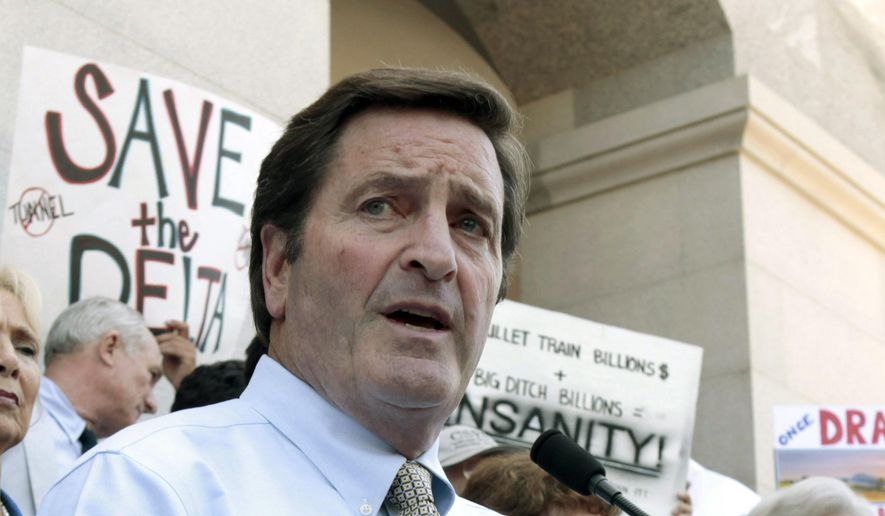Less than two weeks after the Senate passed its $750 billion version of a massive defense policy bill with overwhelming bipartisan backing, House Democrats are staring down a rockier road to passing their $733 billion version of the bill, with some Democrats rallying for a smaller budget and Republicans demanding a higher topline figure.
House Speaker Nancy Pelosi and top Democratic leaders are anxiously trying to head off a repeat of the embarrassing fight over a recent border security bill, when divisions between liberals and moderate in their caucus left the House forced to swallow the version of the bill passed by the Republican-dominated Senate.
Rep. John Garamendi, California Democrat and a key voice on the House Armed Services Committee, said Tuesday that every member — himself included — can pick out an expenditure in the proposed National Defense Authorization Act they believe is unnecessary. He knows there are a handful of members who would prefer an even lower figure for the Pentagon.
“The appetite of the Department of Defense is unlimited. The resources that we have provided our adequate for the challenges, president and future,” he said.
Although Mr. Garamendi, who chairs the Armed Services Committee’s readiness subpanel, is confident the bill will pass in the House, it is set up to be more difficult than in recent years.
Rep. Pramila Jayapal, Washington Democrat, told The Washington Post this week that “the bill that got passed out of committee has some good things but won’t be strong enough for progressives to vote for it.” The $733 billion spending level would be “impossible” for liberal Democrats to get behind, she added.
With Republicans expected to overwhelmingly opposed to the Democratic version, Mrs. Pelosi can afford only a small number of defections.
With tensions in the Middle East surging, House Democrats have gathered support for legislation that mirrors a failed Senate measure that would have prohibited the use of Pentagon funds for military action against Iran and required congressional approval to go to war.
Rep. Ro Khanna, a California Democrat who serves on the Armed Services Committee and is a vice chair on the 90-member Congressional Progressive Caucus, has co-sponsored the amendment with Florida Republican Rep. Matt Gaetz that would prevent funds for a war with Iran. His spokesperson told the Times that passing amendment, which has seen support from over 70 House members, “is the only way to stop Trump from starting another bloody, endless war.”
The progressive caucus was huddling Tuesday night to map its strategy in the NDAA policy expected in the coming days, Politico reported.
But Mr. Khanna “believes progressives should, and is hopeful will, ultimately support the NDAA,” the spokesperson said, even as they press for a lower spending ceiling.
The congressman has also proposed an amendment that would freeze FY20 spending levels to the current $716 billion defense budget.
Mr. Garamendi said in an interview he believes “the number that we came up with … meets all of the known needs of the military. Money that is necessary to be spent wisely.”
“The Republicans seem to want to spend a lot of money that they’re borrowing,” Mr. Garamendi added. “I do believe we have an enormous deficit, but apparently the Republicans are no longer deficit hawks.”
GOP members in both the House and Senate have pushed for more spending on defense after former Defense Secretary James Mattis and several top Pentagon officials testified that the military requires a 3% to 5% budget increase every year to maintain readiness and modernize U.S. forces.
Texas Rep. Mac Thornberry, the ranking Republican on the House Armed Services Committee, has led the push to increase defense spending that would match the Senate’s bill.
“There are real concrete things that is the difference between what we can do for our troops and what we can do for the nation at $733 [billion] vs. $750 [billion],” he said during the committee’s markup last month.
A spokesman said Tuesday that Mr. Thornberry was “disappointed that we as a collective committee had not been able to figure out how to come together,” after the House version capped the increase at 2.3%.
The NDAA is traditionally bipartisan legislation. Senate Armed Services Committee Chairman James Inhofe, Oklahoma Republican, said after the passage of the Senate’s NDAA that he was confident there is some room to negotiate a compromise budget number to pass the legislation by October.
• Lauren Toms can be reached at lmeier@washingtontimes.com.




Please read our comment policy before commenting.